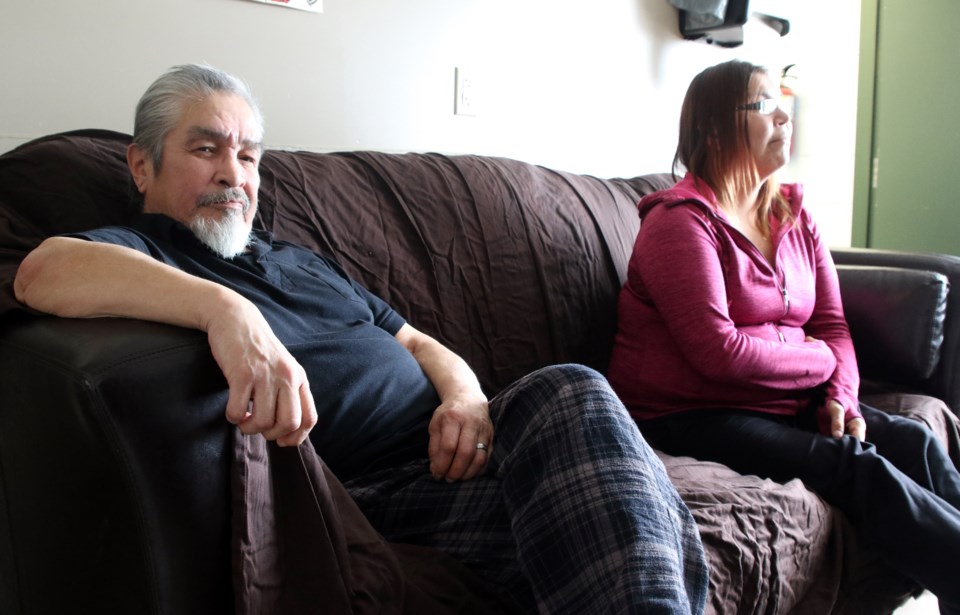An empty beer case was within Wilfred Waboose's reach when the 66-year-old was found unconscious near the railroad tracks in September.
The Pic River First Nation member felt he'd reached the end of the line in his relationship with alcohol. Waboose had spent years under crippling addiction, drinking mouthwash through his days to the point where the first emotion he felt upon waking up was fear.
That day's fear was different and his ability to meet it differently changed everything.
Waboose recalled a friend speaking of a Shelter House program that was built to ease addicts off of non-beverage alcohol substitutes. He would be served a six-ounce glass of wine every 90 minutes until 11 p.m. and be rented a room he could call his own.
Three months after Waboose checked into the Kwae Kii Win Managed Alcohol Centre, all his temptation to return to drinking Listerine is gone.
"My coming here was a last resort. It saved my life," he said.
"I saw where I was going and where alcohol was taking me. I know friends of mine have passed away over alcohol and I didn't want that to happen to me."
Four years after it was founded, Kwae Kii Win's advocates argue its benefits reach beyond its residents. Shelter House executive director Gary Mack claims the program's $300,000 annual price tag more than offsets a 40 to 70 per cent reduction in the cost of that population's incarceration, hospitalization and detox services.
"It's actually very expensive to have people not housed," Mack said.
"People who are in this program are housed, they pay rent to live here, they're part of a community, their health improves. It's just a win-win, all around."
A University of Victoria study conducted in 2014 backed up those claims, stating Shelter House patients' health stood "in sharp contrast to the harms this population is exposed to on the street."
Funding has been Kwae Kii Win's greatest challenge since its inception but a financial commitment the North West Local Health Integration Network made on Wednesday could mark a long-term swing in its fortunes.
The LHIN announced $185,000 in "high-priority investment" funding that will bridge program operations through June. Before that funding expires, LHIN acting chief operator Bryan Ktytor committed his agency would conduct a comprehensive review of both the program and its Regional Mental Health and Addictions Plan.
A similar review of a new managed alcohol program in Kenora resulted in 100 per cent LHIN funding in October.
"This was an interim step," Ktytor said of the one-time funding for Shelter House.
"It's a very successful program as it is. The health outcomes are very, very strong. This will allow us to seamlessly continue on and allow us the opportunity to take a comprehensive look at what it should look like in the long run."
Shifting the cost?
The rising municipal cost of homelessness has been a point of contention for Westfort Coun. and Intergovernmental Affairs Committee chairman Joe Virdiramo.
The municipal budget contribution to Shelter House's operations increased from $130,000 to $200,000 to show support for the managed alcohol program when it was launched in 2012. During the 2016 budget process, city council voted to accommodate a $188,000 request the Shelter House made to keep the managed alcohol and S.O.S. programs alive.
When added to the city's $319,000 contractual commitment to the homeless shelter's operating funds, Shelter House received half a million dollars from Thunder Bay's municipal budget alone.
Virdiramo said he's "cautiously optimistic" the LHIN process will result in the program receiving permanent funding. He vowed to continue applying pressure to Finance Minister Charles Sousa as well as Health and Long Term Care Minister Eric Hoskins to ensure other programs won't be sacrificed if the LHIN makes a long-term commitment to managed alcohol.
"Our particular LHIN has a certain amount of money and that money has been dedicated to specific programs so if it takes on other programs like the managed alcohol program, one of the other programs would be limited or dropped," Virdiramo said.
"What we're going to do is make sure the government is aware and increased funding comes to the LHIN so it can continue with this program."
For Waboose, the managed alcohol program has become synonymous with his safety. The nightmares that haunted him only a season ago have all but disappeared and the fear he felt waking up has been replaced with anticipation for his morning coffee.
To those who knew him then, his message is that he's not in danger anymore.
"The people I know out there -- my family and friends -- they don't have to worry about me in the cold, winter months. I'm in a safe environment."
